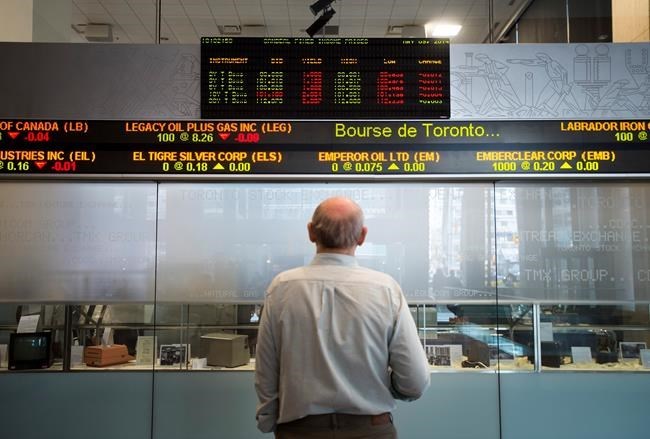
A man watches the financial numbers at the TMX Group in Toronto's financial district on May 9, 2014. THE CANADIAN PRESS/Darren Calabrese
Republished September 22, 2022 - 2:21 PM
Original Publication Date September 22, 2022 - 8:41 AM
TORONTO - Canadian and U.S. markets were again under pressure Thursday after the Federal Reserve rate decision a day earlier indicated more rate hikes, and economic pain, to come.
"Markets are continuing to absorb the full implications of the Fed decision in terms of the outlook for higher-for-longer interest rates," said Todd Mattina, chief economist at Mackenzie Investments.
On Wednesday, the U.S. Federal Reserve raised its key interest rate by three-quarters of a percentage point to a target of between three and 3.25 per cent, and indicated it could rise to roughly 4.4 per cent by the end of the year.
In a press conference after the announcement Fed Chair Jerome Powell warned that taming inflation could mean slower growth, higher unemployment and potentially a recession.
“The chances of a soft landing,” Powell said, “are likely to diminish.”
The stark warning pushed up bond yields sharply Thursday as investors digested the implications of Powell's remarks, said Mattina.
"The Fed yesterday really acknowledged that it was willing to pay real costs in terms of in terms of output and even jobs in order to get inflation back under control. So we're seeing some of that play through into markets today, including stock markets, which are also down today."
The S&P/TSX composite index closed down 181.86 points, or 0.95 per cent, at 19,002.68.
In New York, the Dow Jones industrial average closed down 107.10 points at 30,076.68. The S&P 500 index was down 31.94 points at 3,757.99, while the Nasdaq composite was down 153.38 points at 11,066.81.
Growth stocks were especially under pressure, with the information technology index on the TSX down 2.61 per cent, including Shopify Inc. down 6.26 per cent, while the cannabis-heavy health care index was down 2.17 per cent.
"It's really technology and growth stocks that are driving the sell off today, as opposed to industrials," said Mattina. "That kind of makes sense because the more growth-sensitive equities tend to be sensitive to changes in long-term interest rates, mainly because their future profits are expected to be long term."
Losses were fairly broad though, with the S&P/TSX energy index down 1.8 per cent and financials down 0.69 per cent.
The uncertainty that's weighing on growth prospects has also resulted in more market swings during, said Mattina.
"Volatility within the trading days has picked up in recent weeks. We've seen much more volatility within the day, especially in equities."
The prospect of rising rates in the U.S. and lower growth also put continued pressure on the loonie. The Canadian dollar traded for 74.18 cents US compared with 74.64 cents US on Wednesday.
Canada's currency is dropping in part because inflation came in below expectations at last read, while in the U.S. it surprised to the upside.
"Inflation trends are starting to diverge between Canada and the U.S.," said Mattina. "So the outlook for the Bank of Canada hiking rates is starting to look a little less hawkish than the Federal Reserve which is facing more inflation momentum at the moment."
The November crude contract was up 55 cents at US$83.49 per barrel and the October natural gas contract was down 69 cents at US$7.09 per mmBTU.
The December gold contract was up US$5.40 at US$1,681.10 an ounce and the December copper contract was flat at US$3.47 a pound.
This report by The Canadian Press was first published Sept. 22, 2022.
Companies in this story: (TSX:GSPTSE, TSX:CADUSD=X)
News from © The Canadian Press, 2022